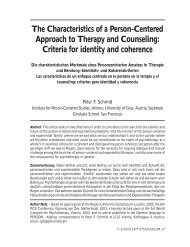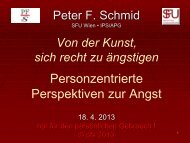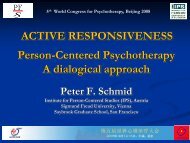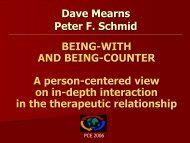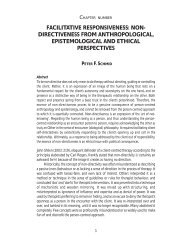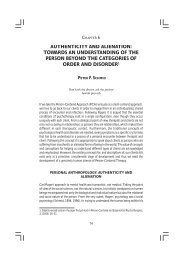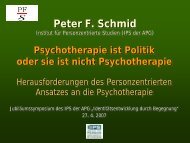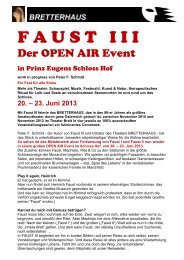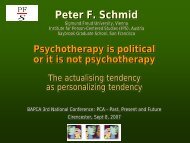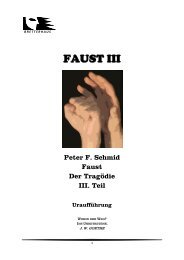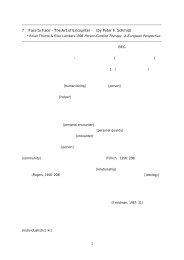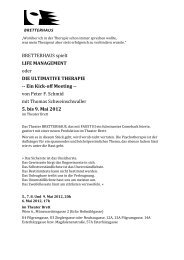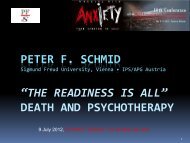Editorial 1.12.p65 - Peter F. Schmid
Editorial 1.12.p65 - Peter F. Schmid
Editorial 1.12.p65 - Peter F. Schmid
Create successful ePaper yourself
Turn your PDF publications into a flip-book with our unique Google optimized e-Paper software.
<strong>Editorial</strong><strong>Editorial</strong>The Person-Centered Approach to psychotherapy and counseling has undergone dramaticchanges over the past few decades. Although its prominence in the USA, where it originated,has declined, it has strengthened in many other parts of the world, particularly in Europe.Another evolution is its growth into the broader and larger ‘family’ of ‘person-centered andexperiential psychotherapies’ reflective of different emphases. This ‘family’ now includesworkers with ‘process-experiential’ and ‘focusing-oriented’ stances, as well as a range of opinionwithin the mainstream ‘client-centered’ tradition. Within any ‘family’ there are tensions aswell as commonalities. Therapists of one emphasis will often think of the worst cases whenthey imagine the other, forgetting that highly skilled workers tend to be similar to each otherin their practice. On the other hand, differences also challenge one to clarify and developone’s own view. This new journal, Person-Centered and Experiential Psychotherapies, seeks toprovide a forum for exploring these tensions and commonalities and for a dialogue amongthe positions, presenting the developments within the paradigm to the wider world of therapypractice, accreditation, and academia. The journal will not give preference to any parts of thewider ‘family’, though it will set strong academic expectations for submissions. The officialposition of the journal is that of the World Association itself; to quote from the Preamble toits Statutes (see also the Appendix to this issue):The terms ‘Person-Centered’ and ‘Experiential’ and the concepts and processes theyencompass have an extensive, rich and evolving history. The choice of the phrase‘Person-Centered and Experiential’ is intended to promote continued dialogue anddevelopment; it is not intended to favor any particular understanding of theseapproaches and their relationship.We expect the journal to become a preferred place of publication for those who wish theirwork to be considered worldwide. In the present volume we have eleven papers from writersdistributed across seven countries: Australia, Austria, Belgium, Germany, Holland, Scotland,and the USA. Yet this distribution falls far short of our future aspirations; we are looking fordevelopment particularly in regard to work coming from Latin America and Asia, and to thework of female authors, who are still underrepresented here but will not be in the next issues.Person-Centered and Experiential Psychotherapies will restrict its attention to therapy andcounseling, rather than to the wider application of the person-centered paradigm. However, it willattend to all aspects of therapy: practice, theory, research, training, and the underlying philosophyand social context of our therapies. Indeed, the present volume has papers focusing upon all theseareas. The aim in this volume is to review the present position of the approaches, following onfrom the early contribution of Carl Rogers and looking forward to the needs of the future. Inpreparing this volume, part of our job as editors has been to remind authors to consider parallelsto their work in other parts of the world and in other languages. In time this bridging process willbe a major function served by the very existence of this international journal.It has been possible to begin the journal with a double issue at the end of 2002 becausePerson-Centered and Experiential © Elliott, Psychotherapies, <strong>Schmid</strong>, Mearns Volume 1477-9757/02/01001-31, Numbers 1&2 1
<strong>Editorial</strong>of the high level of contributions from authors. The eleven papers include an opening articlefrom Germain Lietaer, the Chair of the Board of the World Association for Person-Centeredand Experiential Psychotherapy and Counseling. Entitled The United Colors of Person-centeredand Experiential Psychotherapies, Lietaer’s paper presents his view of the development of clientcenteredtherapy in recent times to include a strong existential influence and emphases suchas ‘process-experiential’ and ‘focusing-oriented’. He investigates the coherence of this widerparadigm and the distinctive factors in it compared with others. We are sure that his paperwill stimulate discussion and further contributions.This is followed by three papers on the development of the self: Dave Mearns, in apaper entitled Further Theoretical Propositions in Regard to Self Theory within Person-centeredTherapy presents a summary of his recent work on ‘relational depth’ and ‘configurations ofself’, before going on to outline nine theoretical propositions designed to retrieve the dialogicalquality evident in Rogers’ earlier Self-Theory and render it more suitable to embrace thesocial dimension. A fundamental ingredient of Rogers’ theory is the ‘actualizing tendency’,which is the focus of Jobst Finke’s paper, Aspects of the Actualizing Tendency from a HumanisticPsychology Perspective. As well as offering a close analysis of the concept of the actualizingtendency in terms of its philosophical roots, Finke outlines a framework for examining howthe actualizing tendency expresses itself in the way a person leads his or her life. He traceshow ‘incongruence’ relates to blocks to the actualizing tendency, reflecting disorders in theself-system, which are manifested in the self-concept. Another aspect of the self, the innercritic, is the subject of the third paper in this set, by Nele Stinckens et al., The Valuing Processand the Inner Critic in the Classic and Current Client-centered/Experiential Literature, in whichRogers’ concept of the inner valuing process is deconstructed and a more pluralistic, interactiveview is proposed.After these papers, the focus shifts to two papers that attempt to identify the essence ofthe therapeutic relationship in person-centered and experiential therapies. <strong>Peter</strong> F. <strong>Schmid</strong>offers a philosophical analysis of the paradigm in his paper, Knowledge or Acknowledgement?Psychotherapy as ‘the art of not-knowing’ – Prospects on further developments of a radical paradigm.He highlights ‘person’, ‘encounter’, and therapist ‘presence’ as central dimensions within theparadigm and explores its ethical and epistemological foundations. The focus on ‘presence’ isalso taken by Shari Geller and Les Greenberg in an empirical paper, Therapeutic Presence:Therapists’ experience of presence in the psychotherapy encounter. In this qualitative study, theauthors capture the quality of presence and investigate its process and how therapists ofprimarily humanistic backgrounds experience it.The next two papers deal with research and research policy. John McLeod offers thepaper Research Policy and Practice in Person-centered and Experiential Therapy: Restoring coherence.In it he offers an original review of the central ‘discoveries’ made about the paradigm in thework done at Chicago and Wisconsin, showing the factors that contributed to this effectiveresearch process. The paper goes on to review more recent research and to propose a futureagenda for developing research policy and practice. The other paper on research is RobertElliott’s 2002 ‘Mary Kilborn Lecture’ under the title Render unto Caesar: Qualitative andquantitative knowing in research on humanistic therapies. The central thesis of the paper is that2 Person-Centered and Experiential Psychotherapies Volume, 1, Numbers 1&2
<strong>Editorial</strong>although quantitative outcome research tells us little about the important aspects of thetherapeutic process, it is essential in most countries where therapeutic services are centrallycommissioned. Elliott includes an outline of his ‘Experiential Therapy Meta-Analysis Project’,a ten-year endeavor to collate the outcomes from research projects worldwide.This special inaugural issue concludes with three papers dealing with the social andhistorical context, with implications for future development. Hans Swildens in Where DidWe Come From and Where Are We Going: The development of person-centered psychotherapy andMartin Van Kalmthout, in The Future of Person-centered Therapy: Crisis and possibility, bothcontribute to a review of the development of the paradigm in continental Europe in thetwentieth century. Swildens goes on to offer five challenging propositions for the futuredevelopment of the paradigm, and Van Kalmthout examines the dangers afforded by suchfactors as the growth of an ‘evidence-based’ culture where only a narrow conception of‘evidence’ is permitted. To conclude this section, Godfrey Barrett-Lennard offers the paperThe Helping Conditions in Their Context: Expanding change theory and practice, in which hereminds us that the client–therapist relationship is not a closed system. While Rogers onlymentioned client ‘incongruence’ as an entry variable into therapy, many more social andcultural dimensions require attention. Indeed, these need to be taken into consideration asactive variables if we are to understand the process of therapy and its effectiveness.Finally, as an Appendix, we include the Preamble, Principles and Goals section of theStatutes of the World Association, where it will be readily accessible for readers.We believe that this volume accurately represents many of the key current developmentsin the paradigm. However, an important omission is work with difficult client populationsor processes. We hope to represent this area of work in Volume 2.To conclude, and to begin: A hundred years on from Carl Rogers’ birth, we find ourselves inthis place, beginning something new. We speak with many voices, but his voice is in all ofthem: repeating, elaborating, extending; wondering, questioning, deepening; speaking,listening, hearing (we hear his voice speaking in our listening). We face challenges: Who nowlistens to us, in the clamoring marketplace, with so many other voices? Do we really listen toeach other, or do we only hear what we imagine the other to be saying? Do we have thecourage to move forward? Or is there a fear that the loss of our former place is too great? Andare we willing to risk the rigors of disciplined research and theory development?The World Association and this Journal are attempts to create a space in which toaddress these and other essential questions. And so we find ourselves engaged once again intrying to contribute the art and science of psychotherapy -– not just for our own paradigm,but in general. In doing so, we commit ourselves to a wise–foolish act of faith: That theseideas, and the experiences they point to, have a future beyond our lives and disagreements;that joining the voices of our many ‘tribes and nations’ will result in a telling that continuesand contributes to the growth of the human spirit, in times of confusion and darkness, aswell as in moments of clarity and light.Robert Elliott, Dave Mearns, <strong>Peter</strong> F <strong>Schmid</strong> August 2002Person-Centered and Experiential Psychotherapies, Volume 1, Numbers 1&2 3



